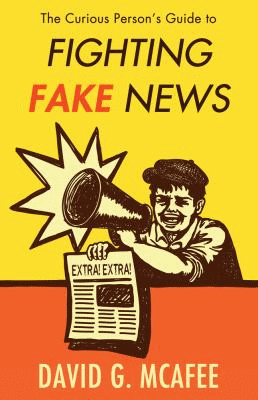It can be difficult to know which things we hear are true and which are not, even from news sources. News literacy is the ability to determine the credibility of news and other information and to recognize the standards of fact-based journalism to know what to trust, share, and act on. The News Literacy Project offers free resources for the public, including an app, a new podcast, shareable tips, tools, and quizzes. Learn about trending falsehoods and how to better judge your news sources to make informed decisions. Get started at newslit.org/for-everyone. Here are also some titles in the FVRLibraries collection on the topic of news and information literacy. I hope it helps if you’re feeling overwhelmed with contradictory information, as many of our patrons are these days.
- The constitution of knowledge : a defense of truth by Jonathan Rauch. Disinformation. Trolling. Conspiracies. Social media pile-ons. Campus intolerance. On the surface, these recent additions to our daily vocabulary appear to have little in common. But together, they are driving a knowledge crisis: a multi-front challenge to America's ability to distinguish fact from fiction and elevate truth above falsehood.
- Beyond fake news : finding the truth in a world of misinformation by Justin P. McBrayer. This book offers a technological and market-based explanation for how our informational environment became so polluted. It shows how news outlets often have incentives to mislead us, and how consumers of information often have incentives to be misled. It chronicles how, as technology improves and the regulations drop, our information landscape becomes more littered with misinformation.
- Fighting misinformation : digital media literacy (DVD) by Great Courses, or streaming on Kanopy. Learn how to reduce the threat of misinformation from local, national, and international sources and ensure the validity of the information you share.
- The curious person's guide to fighting fake news by David McAfee. Journalist David G. McAfee covers the many definitions of "fake news" now and throughout history, from ideologically motivated disinformation operations to commercially motivated misinformation campaigns, and he presents a number of practical and actionable suggestions for combating it.
- The anatomy of fake news : a critical news literacy education by Nolan Higdon. Since the 2016 U.S. presidential election, concerns about fake news have fostered calls for government regulation and industry intervention to mitigate the influence of false content. These proposals are hindered by a lack of agreement about the definition of fake news or its origins. Media scholar Nolan Higdon contends that expanded access to critical media literacy education, grounded in a comprehensive history of fake news, is a more promising solution to these issues.
Library tip of the month: Stream documentaries, films, and educational content, including Great Courses, on Kanopy. It’s free with your library account. No library account? No problem. Sign up online for instant access to many services. In fact, September is Library Card Sign Up Month, so if you or anyone you know needs a library card, there’s never been a better time!

